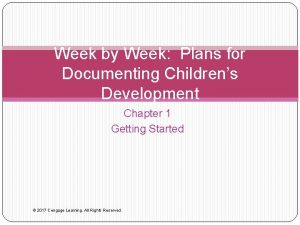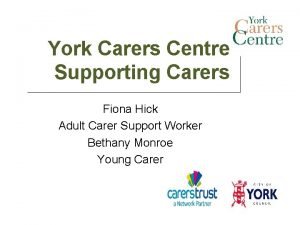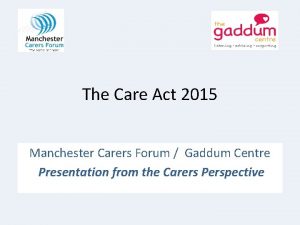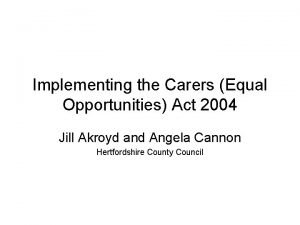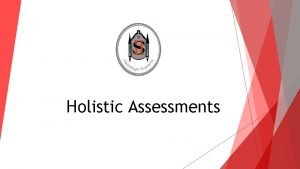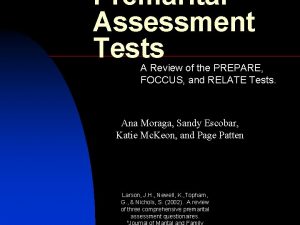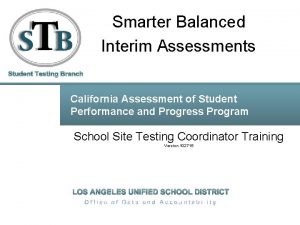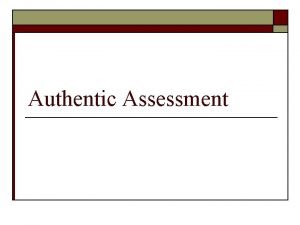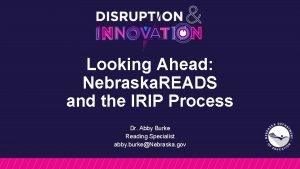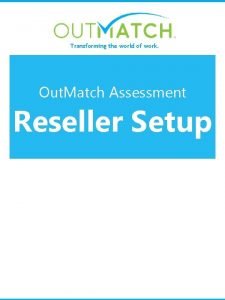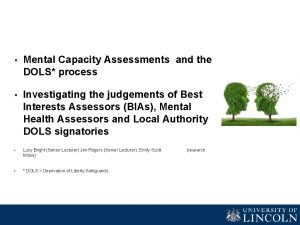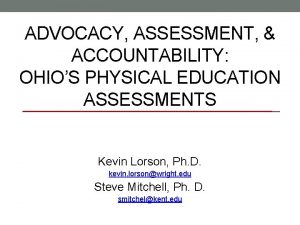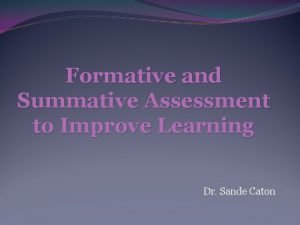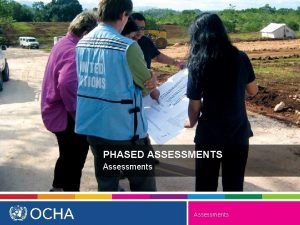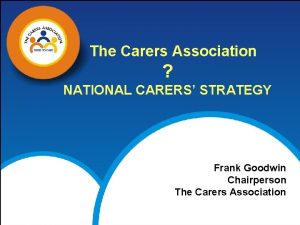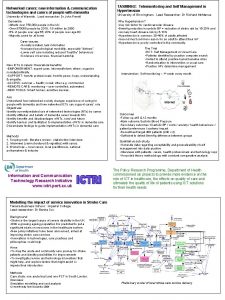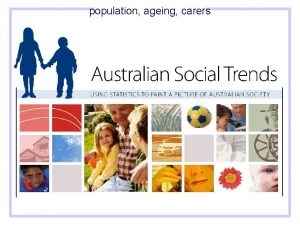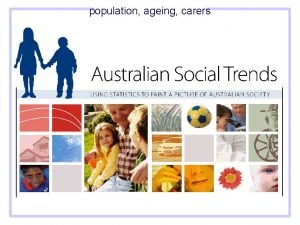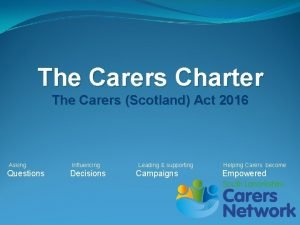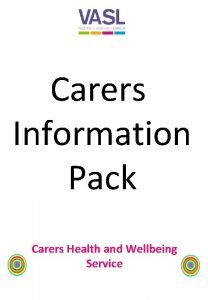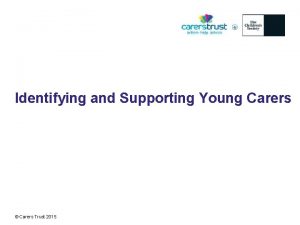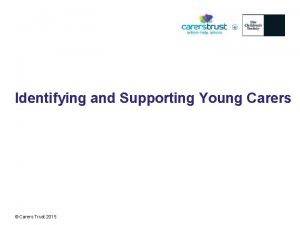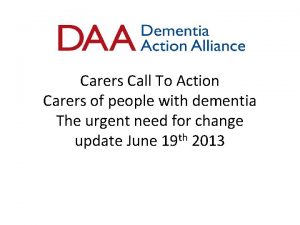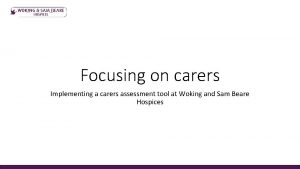Carers Week A Presentation on Carers Assessments the























- Slides: 23

Carers Week A Presentation on Carers Assessments & the impact of Covid-19 on Carers Assessments Delivered by Disability Law Service

What is a carer & what is the Authority’s duty to a carer? • A carer is defined as an adult who provides or intends to provide care for another adult, who, in that context, is an ‘adult needing care’. S 10(3) Care Act 2014 Local Authority’s Duty • Where is appears to a local authority that a carer may have needs for support (whether currently or in the future), the authority must assess – a) Whether the carer does have needs for support (or is likely to do so in the future) b) If the carer does, what those needs are (or are likely to be in the future) S 10(1)(a-b) Care Act 2014

What must the assessment address? • A carer’s assessment must include an assessment of – - Whether the carer is able, and is likely to continue to be able to provide care for the adult needing care; - Whether the carer is willing, and likely to continue to be willing to do so; - The impact of the carer’s needs for support - The outcomes the. Whether, and if so, to what extent the provision of support could contribute to the achievement of those outcomes - carer wishes to achieve in day to day life

Carers Eligibility Criteria In considering whether a carer has eligible needs, local authorities must consider whether - The needs arise as a consequence of providing necessary care for an adult; - The effect of the carer’s needs is that any of the circumstances specified in the Eligibility Criteria apply to the carer; - As a consequence of that fact there is, or is likely to be, a significant impact on the carer’s well-being. Regulation 3(1)(a-c) Care and Support (Eligibility Criteria) Regulations 2014

What are the outcomes? To be eligible, a carer must be unable to achieve any of the following outcomes a) Carrying out any caring responsibilities the carer has for a child b) Providing care to other persons for whom the carer provides care c) Maintaining a habitable home environment d) Managing and maintaining nutrition e) Developing and maintaining family or other significant personal relationships f) Engaging in work, training, education or volunteering g) Making use of necessary facilities or services in the local community h) Engaging in recreational activities

Carers Wellbeing & Fluctuating Needs As a consequence, there is or is likely to be a significant impact on the carer’s wellbeing including, physical and mental health and emotional wellbeing, personal dignity, social and economic wellbeing, contribution to society, suitability of living accommodation, domestic, family and personal relationships protection from abuse and neglect, and participation in work, education, training or recreation. Fluctuating Needs • Local Authorities must consider an individual’s needs over an appropriate period of time to ensure that all of their needs have been accounted for when the eligibility is being determined. Carers with fluctuating needs may have needs which are not apparent at the time of the assessment, but may have arisen in the past, and are likely to arise again in the future. • Where a carer’s fluctuating needs are apparent, this should also be factored into the care plan detailing the steps local authorities will take to meet needs in circumstances where these fluctuate.

Example Case Study • Issue – Amanda looks after her mother who had a stroke. Amanda also has two children and has a full-time job. Amanda no longer has time to attend her evening running club as she needs to look after her mother. She has come forward for an assessment as she is struggling to look after her mother, and her children, and manage her job. • Caring responsibility – Mother with a stroke • Outcomes – Amanda wants to spend more time with her children and attend her running club. Her needs impact on the following outcomes: • Carrying out caring responsibilities the carer has for a child • Engaging in recreational activities • Impact on wellbeing – Amanda feels that she does not have time for her children which is affecting their relationship. She also feels stressed not being able to engage in her hobby and is beginning to feel isolated. • Decision – The local authority provide Amanda with a direct payment to pay a carer to come in two days every two weeks to look after her mother while she attends her running club and spends time with her children.

Parent Carer Assessments • S 17 ZD(2) Children Act – A parent carer is a person aged 18 or over who provides or intends to provide care for a disabled child • A local authority must assess whether a parent carer within their area has needs for support, and if so, what those needs are • There are two conditions a) First – that it appears to the LA that the parent carer may have needs for support or the LA receives a request for the parent carer to assess the parent carer’s needs for support b) Second – the LA are satisfied that the disabled child care for and the disabled child’s family are persons for whom they may provide or arrange for the provision of services • A parent carer’s needs assessment must include an assessment of whether it is appropriate for the parent carer to provide or continue to provide care for the disabled child in light of the parent carer’s needs for support, other needs and wishes. • The assessment must also take into account the wellbeing of the parent carer and the need to safeguard and promote the welfare of the disabled child cared for and any other child for whom the parent carer has parental responsibility.

Young Carers • A young carer is a person under the age of 18 who provides or intends to provide care for another person • A local authority must assess whether a young carer within their area has needs for support and, if so, what those needs are • A young carer’s needs assessment must include an assessment of whether it is appropriate for the young carer to provide, or continue to provide, care for the person in question – considering the young carer’s needs for support, other needs and wishes • The LA in carrying out the young carer’s needs assessment must have regard to (a) The extent to which the young carer is participating in or wishes to participate in education, training or recreation, and (b) The extent to which the young carer works or wishes to work

Assessments in light of Coronavirus Act 2020

Coronavirus Act 2020 s 15 & Schedule 12 Part 1 • The Act replaces duties to assess and meet eligible needs have been replaced with: • A duty to meet needs for care and support where not to do so would be a breach of an individuals human rights and • A power to meet needs in other cases

Duty to Assess Needs Schedule 2, para 2 (1) – (3) - A local authority does not need to comply with its duties under: s 10 Assessment of carer support needs Regs made under 12(1) or (2) – conducting of assessments & (4) provision of written records S 13 Eligibilty determination s 63 -64 Assessment of young carer approaching 18 years Regs made under s 65(1) – conducting of assessments under s 58 -64 Sch 12, para 2(4) Authority’s can conduct assessments or determinations where they considers it appropriate

Duty to Assess finance Sch 12, para 4 • Authorities do not need to conduct financial assessments under s 17(3) CA 2014 • Authorities must not charge for meeting needs during the period the Schedule is in effect, without making a financial assessment • Authorities have powers to conduct financial assessments at a late date and charge of needs met before the assessment – provided the person has been informed at or nefore the service is carried out (Annex B, Care Act easements; Guidance for local authorities)

Duty to Review & Prepare Plans Schedule 2, para 11 • Authorities do not need to prepare Support plans pursuant to s 24 • Authorities do not need to comply with specification requirements relating to plans in s 25 • Authorities do not need: - to conduct regular reviews or - conduct reassessments where circumstances have changed or - take reasonable steps to reach agreement with an adult where they propose to change how needs are met

Meeting carer needs Schedule 12, para 6 • S 20 replaced with: • • (1)A local authority must meet a carer’s needs for support if— • “(aa)the authority considers that it is necessary to meet those needs for the purpose of avoiding a breach of the carer’s Convention rights” • And • “In this subsection “Convention rights” has the same meaning as in the Human Rights Act 1998. ”

CVA 2020 applies retrospectively Schedule 12, para 16 • Suspensions and modifications in Sch 12 apply to duties arising before and after the commencement of the CVA ( Part 1, CA ’ 14, CSDPA ‘ 70 and s 17 ZH CA ‘ 89

The Guidance: Care Act easements: guidance for local authorities 31. 03. 2020 • Sch 12, para 18 - Power to issue guidance - Authorities must have regard to guidance issued - Authorities must comply with guidance issued, as the Secretary of State directs (in future) - Authorities may disregard guidance under s 78 CA ‘ 14 and Local Authority Social Services Act 1970 • Easements ‘should only be exercised by Authorities where is it resasessment to maintain the highest possible level of services. ’ (para 4, Easements Guidance) • Authorities should comply with pre-amendment Care Act provision and related Care and Support Statutory guidance for as long and as far as possible (para 4) • Local authorities should only take a decision to begin exercising the Care Act easements when the workforce is significantly depleted, or demand on social care increased, to an extent that it is no longer reasonably practicable for it to comply with its Care Act duties (as they stand prior to amendment by the CVA) and where to continue to try to do so is likely to result in urgent or acute needs not being met, potentially risking life. ’ (para 6)

Steps to be taken by Authorities before exercising Care Act easements - Sch 12, para 6 & Annex B • Decision must be taken by the Director of Adult Social Services with recommendation from Principal Social Worker • Lead Member , Health and Welling Board is involved • NHS CCG leadership is informed • The Decision: • Should be documented with evidence taken into account • The record should include a list including: • - nature of changes to workforce • - steps taken to mitigate against need for this to happen • - expected impact of measures taken • - how changes will help to avoid breaches of people’s human right • - when decision will be reviewed again • - demonstrate their professional judgement apply the Ethical • Framework for Adult Social Care and where necessary, record • that they have considered the Convention Rights.

Assessments and reviews Annex B - Local Authorities should still assess people’s social care and support needs throughout this period and should make a written record of this assessment. - s 27(2) & (3) – discretion to revise • Care & Support and Support plans and • involve adult/carer remains in force

New Human Rights Duty Schedule 12, para 6 • S 20 Duty and power to meet to carer’s needs for support • (1) A local authority, (REMOVED: having made a determination under section 13(1), must meet a carer’s needs for support which meet the eligibility criteria if— • (a) the adult needing care is ordinarily resident in the local authority’s area or is present in its area but of no settled residence, • (a)(a) the authority considers that it is necessary to meet those needs for the purpose of avoiding a breach of carers’s Convention rights, and • (b) in so far as meeting the carer’s needs involves the provision of support to the carer, there is no charge under section 14 for meeting the needs … • (c) in so far as …. • In this subsection “Convention rights” has the same meaning as in the Human Rights Act 1998. ”

European Convention on Human Rights • Article 2: Right to Life • Article 3: Torture, inhuman or degrading treatment or punishment • Article 5: Right to Liberty • Article 8: Right to respect for private and family life • Article 14: Prohibition of discrimination

Other Legislation • UN Convention on the Rights of Disabled Persons • UN Convention on Right of the Child

Challenges in other cases • Procedural considerations – did the Authority go through the correct decision making process? • Assessments - Authorities should conduct assessments when making individual decisions to refuse, reduce of cease support (R v Gloucestershire CC ex p Barry (1997 -98) 1 CCLR 7 – reducing services without reassessment was unlawful. ) • Revisions - Adults/carers should be involved in any revisions of the plan as LA still has a power to revise a plan (s 27(2) and Authorities will ‘still be expected to carry out proportionate, person-centred care planning which provides sufficient information to all concerned, particularly those providing care and support, often at short notice. ’’(Annex B) Easements)) • HR - Consider Human rights challenges • Request s 18(1) Care Act 2014 support (if appropriate) and (alternatively) exercise their s 19(1) power • S 1 Wellbeing & Statutory purpose - make representations on the authorities s 1 Well-being duty and statutory purpose of CVA 2020 and Padfield v Minister of Agriculture, Fisheries and Food [1968] AC 997 – decisions to reduce or cease support should be exercised in line with purpose of Act. Purpose of CA’ 14: promoting wellbeing and prevention duties Purpose of CVA’ 20: to deal with pressures of Covid-19 by streamlining processes and prioritising cases according to needs (Easements Guidance, para 2)
 Week by week plans for documenting children's development
Week by week plans for documenting children's development York carers centre
York carers centre Barnet carers
Barnet carers Department of work and pensions
Department of work and pensions Manchester carers forum
Manchester carers forum Suction training for carers
Suction training for carers Equal opportunities act 2004
Equal opportunities act 2004 Vigilance awareness week presentation
Vigilance awareness week presentation Holistic assessments
Holistic assessments Aimsweb math benchmarks
Aimsweb math benchmarks Premarital tests or assessments
Premarital tests or assessments Writing analytical assessments in social work
Writing analytical assessments in social work Lausd interim assessments
Lausd interim assessments Definition authentic assessment
Definition authentic assessment Michigan literacy progress profile
Michigan literacy progress profile Irip
Irip Osde assessments
Osde assessments Outmatch assessments
Outmatch assessments Six dols assessments
Six dols assessments Physical fitness components and tests grade 9
Physical fitness components and tests grade 9 Physical education
Physical education Cte technical skills assessments.azed.gov/student
Cte technical skills assessments.azed.gov/student Assessments that favor one group over another are
Assessments that favor one group over another are Formative and summative assessment
Formative and summative assessment
